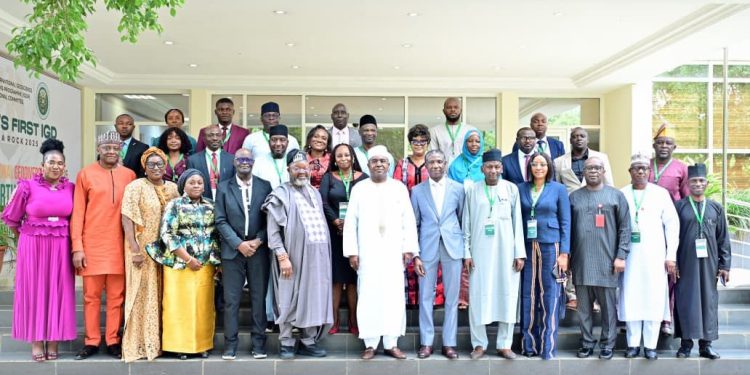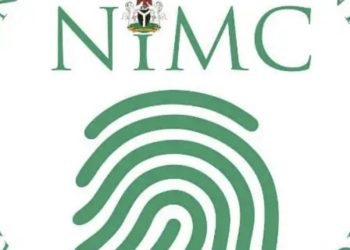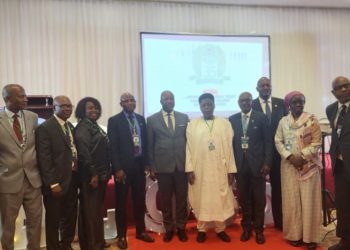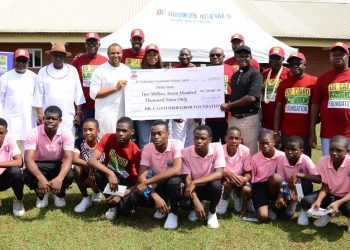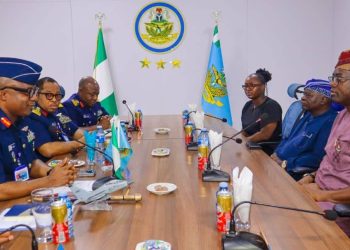By Nkechi Eze
The Chairman and Chief Executive Officer of the National Drug Law Enforcement Agency (NDLEA), Brigadier General Mohamed Buba Marwa (Rtd), has charged stakeholders involved in the formulation of Nigeria’s next National Drug Control Master Plan (NDCMP 2026–2030) to ensure that the new framework effectively responds to emerging trends sustaining the illicit drug trade in the country.
In an official statement released by the NDLEA’s Director of Media and Advocacy, Femi Babafemi, Marwa gave the charge on Monday, 6th October 2025, while declaring open a five-day workshop in Niger State aimed at developing the fifth edition of the National Drug Control Master Plan. The residential retreat is funded by the ECOWAS Commission and supported by the United Nations Office on Drugs and Crime (UNODC).
Addressing participants at the workshop, the NDLEA boss described the exercise as both strategic and historic, emphasizing that Nigeria’s evolving drug challenge requires an equally dynamic response.
“The task before us over the next few days is both strategic and historic. The drug problem continues to evolve, and so must our response. The NDCMP 2026–2030 must be visionary yet practical; comprehensive yet targeted; and nationally owned yet regionally and globally aligned,” Marwa stated. “It must build on the achievements of the past while boldly addressing new and emerging threats, from synthetic drugs to dark-web trafficking, from poly-substance use to the illicit financial flows that sustain the drug trade.”
He reminded participants that the retreat presented a rare opportunity to deliberate, analyse, and agree on the strategic priorities that will shape Nigeria’s drug control response for the next five years.
“It is here that we will identify what has worked, acknowledge the gaps, and design innovative pathways for the future,” he said.
Marwa urged participants to bring to bear their expertise, experience, and commitment in the development process, stressing that the goal was not merely to produce another policy document but to chart a collective vision to safeguard the health, security, and wellbeing of Nigerians.
Reaffirming NDLEA’s commitment to providing leadership, coordination, and technical support for the implementation of the new plan, Marwa pledged that the Agency would continue to strengthen collaboration with both domestic and international partners.
“I also pledge that we will continue to strengthen collaboration with our partners, both within Nigeria and across the ECOWAS sub-region, for we know that the drug challenge recognises no borders,” he assured.
The NDLEA chief expressed gratitude to the ECOWAS Commission for sponsoring the workshop and commended all partners, including the European Union, UNODC, civil society organisations, professional bodies, and the private sector for their sustained collaboration in advancing drug control efforts across the region.
“Together, we are shaping a future where Nigeria and West Africa will be safer, healthier and more secure,” Marwa said.
Speaking on behalf of the United Nations Office on Drugs and Crime, the UNODC Country Representative, Cheikh Ousmane, represented by Dr. Akanidomo Ibanga, commended Nigeria’s drug control achievements under the NDLEA and the Federal Ministry of Health. He noted that while progress had been recorded, global and regional dynamics continue to influence the drug situation, requiring a coordinated and adaptive response.
“We are all aware that the drug situation continues to evolve. Global and regional dynamics, whether related to new psychoactive substances, organized crime networks, or the impact of conflict and economic pressures, all shape local realities. Our response must therefore be adaptive, coordinated, and inclusive. The Master Plan is the instrument through which this can happen,” Ibanga said.
He added that the workshop offered a valuable opportunity to review draft chapters, harmonize perspectives, and ensure that the final document aligns with both national realities and international standards, including the three international drug control conventions, the 2030 Agenda for Sustainable Development, and the African Union Plan of Action on Drug Control.
Also speaking at the opening ceremony, the ECOWAS Commissioner for Human Development and Social Affairs, Professor Fatou Sow Sarr, represented by Dr. Daniel Amankwaah, lauded Nigeria’s proactive approach in developing national strategies consistent with global best practices.
“Nigeria’s current National Drug Control Master Plan will expire this year, and a new plan needs to be developed to address emerging drug threats, trafficking patterns, and the increasing burden of substance use disorders,” he explained. “The new NDCMP will effectively respond to current and future drug-related challenges.”
He disclosed that the ECOWAS Commission, in line with its regional mandate, is providing technical and financial assistance to Nigeria for the development of the new plan, noting that the initiative aligns with the ECOWAS Drug Prevention and Control Programme and the broader regional strategy for drug demand and supply reduction.
“This support is a strategic step toward strengthening Nigeria’s drug control framework and aligning it with regional and international best practices. The ECOWAS Commission remains committed to supporting Nigeria in this effort, ensuring that the new National Drug Control Master Plan is robust, evidence-based, and effectively addresses the country’s drug-related challenges,” Dr. Amankwaah stated.
Other key stakeholders present at the workshop included representatives from the Federal Ministries of Education, Health, Agriculture, and Budget and Planning, as well as the National Agency for the Control of AIDS (NACA), the National Agency for Food and Drug Administration and Control (NAFDAC), the Economic and Financial Crimes Commission (EFCC), and the Nigerian Financial Intelligence Unit (NFIU).


